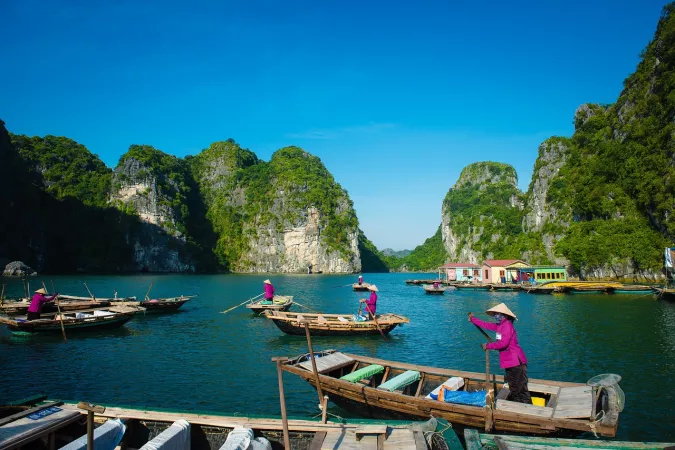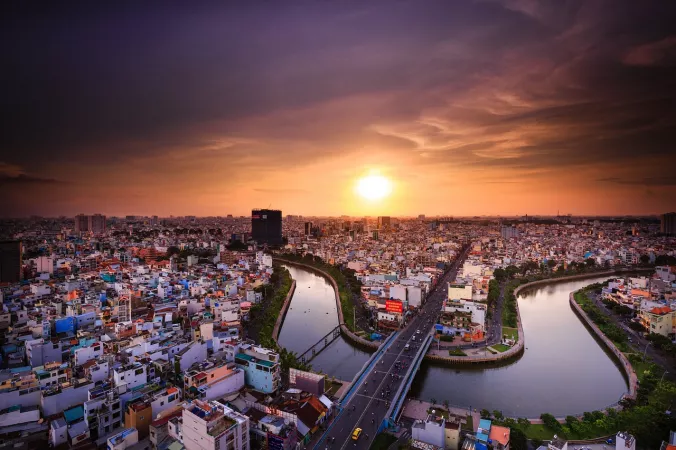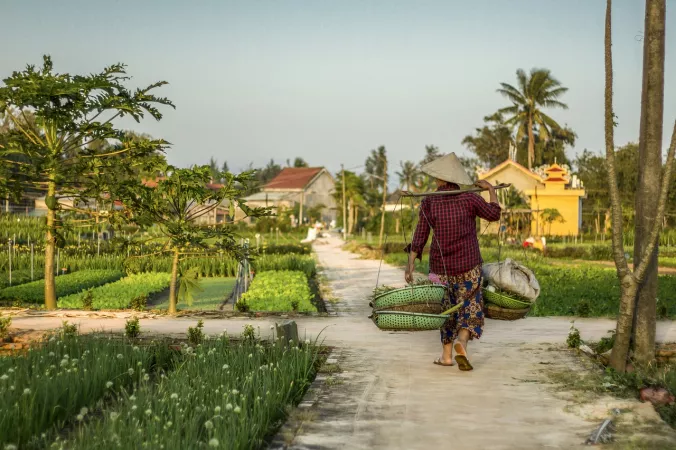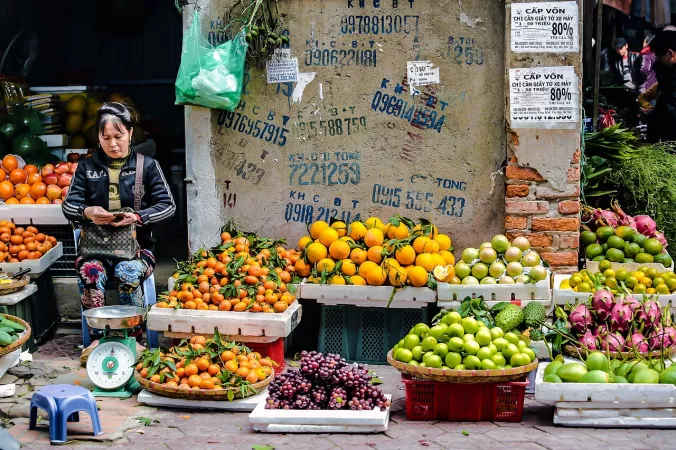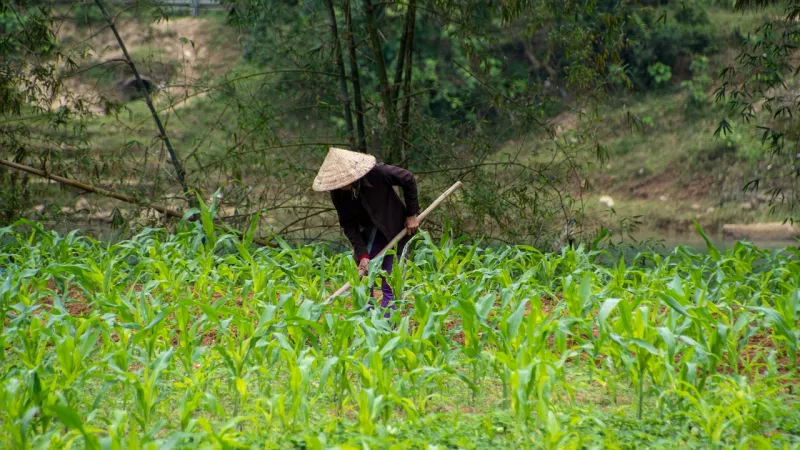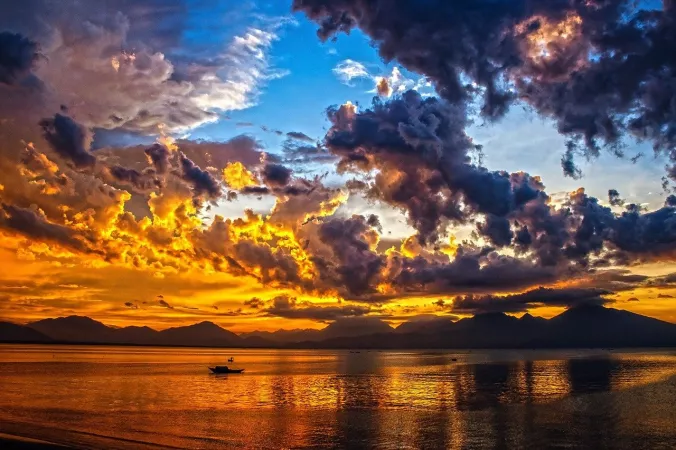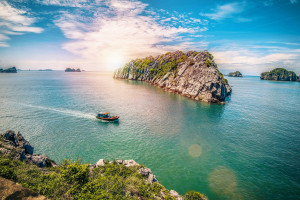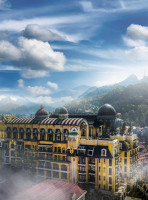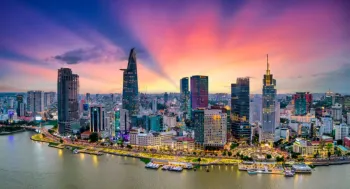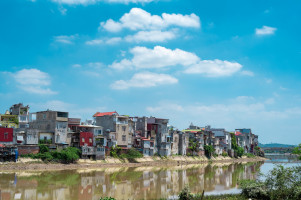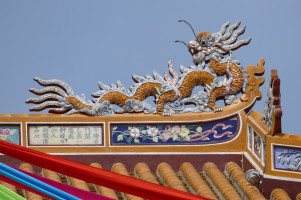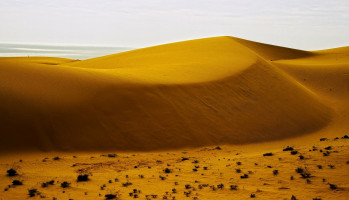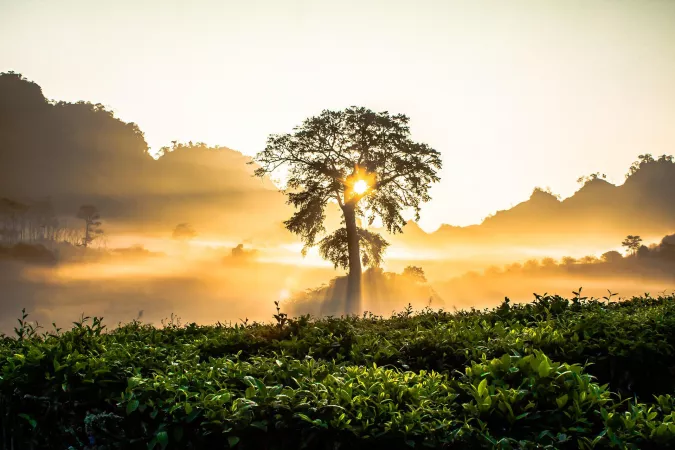
Vietnam
Duration
7 to 14 Days
7 to 14 Days
Best time to visit
Nov-Feb
Nov-Feb
Theme
Adventure, Beaches, Wildlife
Adventure, Beaches, Wildlife
Vietnam Travel Guide
Vietnam, located in Southeast Asia, is a country known for its rich history, stunning landscapes, and vibrant culture. With a history dating back thousands of years, Vietnam has been influenced by Chinese, French, and American cultures, making it a fascinating destination for travelers. The country is famous for its delicious cuisine, bustling cities, ancient temples, and breathtaking natural beauty.Top Attractions in Vietnam
- Ha Long Bay
- Hanoi
- Hoi An Ancient Town
- Hue Imperial City
- Sa Pa Terraces
Vietnam is Famous for
Vietnam is famous for its delectable cuisine, stunning landscapes, and rich history.Top Attractions in Vietnam
- Exploring the limestone islands of Ha Long Bay
- Immersing yourself in the history of Hanoi's Old Quarter
- Admiring the ancient architecture of Hoi An
- Discovering the royal past of Hue Imperial City
- Trekking through the picturesque Sa Pa terraced fields
What's Great about Travelling to Vietnam?
- Experience bustling city life and serene countryside
- Delight in the diverse and delicious Vietnamese cuisine
- Explore ancient temples and historic sites
What's Not So Great about Travelling to Vietnam?
- May encounter language barriers in rural areas
- Traffic congestion in major cities can be overwhelming
- Weather can be unpredictable during certain seasons
Travel Tips for Vietnam
- Ensure to carry cash as credit cards are not widely accepted
- Respect local customs and traditions, especially when visiting temples
- Stay hydrated and use sunscreen to protect against the sun
Important Vietnam trip information
- Ideal Duration: 2-3 weeks to explore the country
- Best Time to Visit: November to April for dry weather
- Nearby Airports and Railway Stations: Hanoi, Ho Chi Minh City, Da Nang
Top 47 Places to visit in Vietnam
Per Person
28,000
*EXCLUDING APPLICABLE TAXES 5.0 Ratings
( 28 Reviews )
( 28 Reviews )
Per Person
29,000
*EXCLUDING APPLICABLE TAXES 5.0 Ratings
( 335 Reviews )
( 335 Reviews )
Per Person
64,990
*EXCLUDING APPLICABLE TAXES 4.8 Ratings
( 54 Reviews )
( 54 Reviews )
Per Person
28,500
*EXCLUDING APPLICABLE TAXES 5.0 Ratings
( 335 Reviews )
( 335 Reviews )
Per Person
26,800
*EXCLUDING APPLICABLE TAXES 5.0 Ratings
( 335 Reviews )
( 335 Reviews )
Per Person
17,220
*EXCLUDING APPLICABLE TAXES 5.0 Ratings
( 22 Reviews )
( 22 Reviews )
FAQ's on Vietnam
Q1: What is the best time to visit Vietnam?
The best time to visit Vietnam is during the dry season, which typically runs from November to April. This period offers pleasant weather with clear skies and lower humidity, making it ideal for exploring the country. However, different regions in Vietnam have varying climates, so it's essential to plan your visit accordingly. The months of September and October are also great for visiting as the weather is cooler in the north and central regions, and it's the harvest season.
Q2: Do I need a visa to travel to Vietnam?
Most visitors to Vietnam need a visa to enter the country. You can apply for a visa online or obtain one through the Vietnamese embassy or consulate in your country. Some nationalities are exempt from visa requirements for short stays. It's crucial to check the specific visa requirements based on your nationality and the purpose of your visit.
Q3: What are the must-visit attractions in Vietnam?
Vietnam is home to a myriad of incredible attractions. Some of the must-visit places include Ha Long Bay, Hanoi's Old Quarter, Hoi An Ancient Town, the Cu Chi Tunnels in Ho Chi Minh City, the Mekong Delta, and the imperial city of Hue. Don't miss exploring the stunning beaches of Phu Quoc and Nha Trang or trekking in the Sapa region for breathtaking views.
Q4: Is Vietnam a safe place to travel?
Vietnam is generally a safe country for travelers. However, like any other destination, it's essential to take precautions. Petty theft can occur in crowded areas, so it's advisable to keep your belongings secure. Avoiding isolated areas at night and being cautious with your valuables can help ensure a safe trip. It's also recommended to drink bottled water and be mindful of food hygiene.
Q5: What is the local currency in Vietnam and can I use credit cards?
The local currency in Vietnam is the Vietnamese Dong (VND). While credit cards are accepted in many hotels, restaurants, and shops in major cities and tourist areas, it's always handy to have cash, especially in more rural areas. ATMs are widely available in cities, making it convenient to withdraw money. Be sure to inform your bank of your travel plans to avoid any issues with card transactions.
Q6: What is the local cuisine like in Vietnam?
Vietnamese cuisine is celebrated for its fresh ingredients, aromatic herbs, and bold flavors. Some popular dishes include pho (noodle soup), banh mi (Vietnamese sandwich), fresh spring rolls, and bun cha (grilled pork with noodles). Vegetarians will also find plenty of options with dishes like pho chay (vegetarian noodle soup) and com tam (broken rice with tofu). Be sure to try the local street food for an authentic culinary experience.
Q7: What transportation options are available in Vietnam?
Vietnam offers various transportation options for travelers. You can get around cities using taxis, cyclos (cycle rickshaws), or motorbike taxis. Long-distance travel between cities can be done by train, bus, or domestic flights. Renting a motorbike is a popular choice for exploring regions like the Central Highlands or the coastal roads, but make sure to have the necessary permits and ride safely.
Q8: Are there any cultural norms or etiquette I should be aware of when visiting Vietnam?
When visiting Vietnam, it's essential to respect the local customs and traditions. Remove your shoes before entering someone's home or a place of worship. Dress modestly when visiting temples or pagodas, covering your shoulders and knees. It's customary to greet people with a smile and a slight bow. When dining, wait for the host to start eating before you begin. Tipping is not mandatory but is appreciated for good service.
Q9: I am a travel agent. How can I buy travel leads of Vietnam?
Register yourself as a travel agent at agents.tripclap.com and then you can buy travel leads to Vietnam once your account is approved. For more details contact our support team at +91-8069186564 or support@tripclap.com
